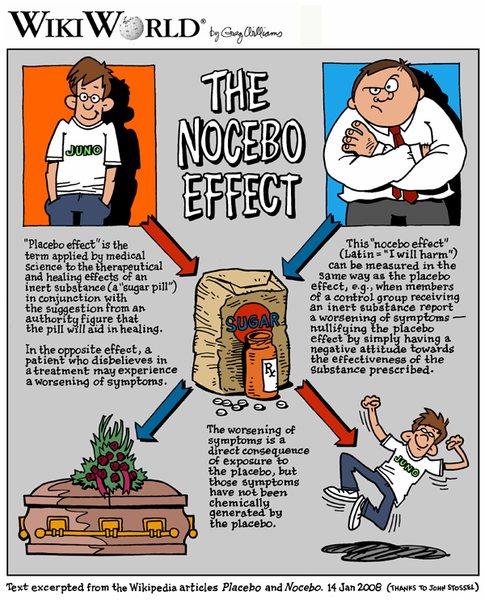Objective: This paper aims to provide an overview on the nocebo effect, focusing on recognition, its phenomenology, at-risk demographic profiles, clinical situations and personality factors, as well as discriminating somatic symptoms in the general population from treatment-related adverse effects. Lastly, the paper addresses available evidence-based strategies for management and minimisation of the nocebo effect.
Method: Data for this paper were identified by searching PubMed using the search terms “nocebo” and “nocebo effect”, augmented by a manual search of the references of the key papers and the related literature.
Results: The nocebo effect refers to non-pharmacodynamic, harmful or undesirable effects occurring after inactive treatment, a phenomenon that also occurs in the context of active therapy. Known drivers include classical conditioning and negative expectations concerning treatment. Recent meta-analyses have reported a considerable prevalence, ranging from 18% in the symptomatic treatment of migraine, to more than 74% in multiple sclerosis. Recognition of the nocebo-driven adverse effects presents a challenge, especially because of its non-specific nature and the similarity to the active medication’s expected profile. Traits such as neuroticism, pessimism and type A personalities may predispose individuals to this phenomenon. Clinical management of the nocebo effect includes awareness and recognition, changing the manner of disclosure of potential drug-related adverse effects, shaping patients’ expectations and enhancing the treatment alliance.
Conclusion: The nocebo effect is a common, clinically significant, yet covert driver of clinical outcomes. Increased awareness of its features, as well as knowledge of strategies on how to manage it, are fundamental so that clinicians can mitigate its impact on clinical practice.
“The nocebo response refers to harmful, unpleasant, or undesirable effects a person manifests after receiving an dummy drug or placebo. Nocebo responses are not chemically generated and are due only to the subject’s pessimistic belief and expectation that the inert drug will produce negative consequences.”
“In these cases, there is no ‘real’ drug involved, but the actual negative consequences of the administration of the inert drug, which may be physiological, behavioural, emotional, and/or cognitive, are nonetheless real.”
“Just when you thought it was safe to into the water again! This is an important phenomenon; we deal with it all the time. Just as some MSers derive benefit from placebos some are harmed by them.”

Actually this whole pla(no)cebo science is quite hilarious.I wonder what the guys who discovered Penicillin think about this fluff!Either a drug works, or not. Everything in between is make-up.We shouldn't really have to worry about placebo if we had ra treatment that actually works (a cure)….
I think we'd need a seance to discover what the penicillin pioneers think of this.I think you are a little hasty in dissing the nocebo effect as it can result in patient assessed outcomes being skewed in placebo groups resulting in a treatment appearing to work better than it does.
hence my point…how could the outcome be influenced if the result is binary? it works, or it doesn't.We already know what the bio-markers of MS are – a drug that blocks all of them will work regardless of nocebo (I'd like to think).Only a mediocre drug will have to worry about a patient's mood at the time of administration….Otherwise, let's dump the DMD, fire the Neuro and replace the whole lot with a priest and regular church attendance (placebo to the max).
"how could the outcome be influenced if the result is binary? it works, or it doesn't."Again it depends what and how you're measuring, if you're talking about DMTs then quantitative measurement such as stopping relapses and confirmation by MRI independent of patient perception is the way to go. However when it comes to areas such as pain, patient-rated scores are the dominant measurewment, which means that the nocebo effect can muddy the waters considerably."Otherwise, let's dump the DMD, fire the Neuro and replace the whole lot with a priest and regular church attendance (placebo to the max)."Or "liberation therapy" 😉
"We already know what the bio-markers of MS are"No we don't. Who told you that, Tony?MD2, it might be an exception, but all "liberated" people i personally know have one think in common (apart from their high level of education): they are miles away from any faith business.